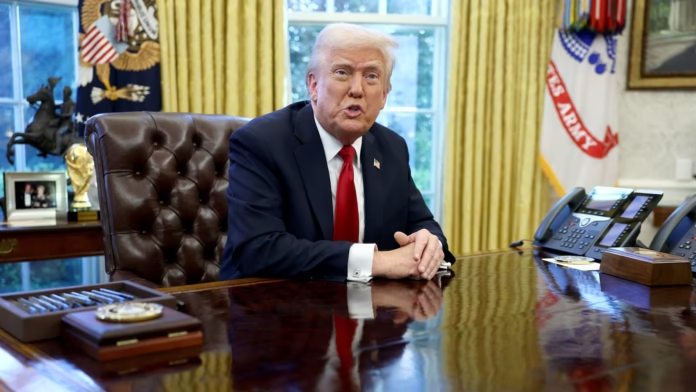In a dramatic move that could reshape global commerce, President Donald Trump announced sweeping 25% tariffs on all imported automobiles effective April 2, declaring the measure would bring “tremendous growth” to American industry while risking severe economic backlash. The decision sent immediate shockwaves through markets, with shares of major automakers like General Motors and Stellantis (parent company of Jeep and Chrysler) tumbling 3-4% as investors grappled with the policy’s disruptive potential—even for U.S. manufacturers reliant on global supply chains.
The tariffs target America’s top vehicle suppliers, including Mexico, South Korea, Japan, Canada, and Germany, and form part of Trump’s aggressive “America First” trade agenda. This follows his recent 20% tariff on Chinese goods over fentanyl production, 25% duties on Mexican and Canadian imports, and revived steel/aluminum tariffs. More controversial measures loom, including a 200% retaliatory tax on EU alcohol after the bloc threatened U.S. spirits, and a 25% levy on countries importing Venezuelan oil—despite U.S. reliance on the same supply.
Economists warn the policies could trigger a destructive trade spiral, with the IMF estimating potential global GDP losses exceeding $1 trillion if retaliations escalate. Consumers may face higher prices as import costs trickle down, while U.S. automakers confront squeezed profits from pricier components. The UK and other allies brace for collateral damage, with analysts suggesting Trump’s earlier tariff threats alone could shave 1% off British GDP.
Defiant at his White House announcement, Trump framed the tariffs as economic justice: “We’ll effectively be charging what other nations charge us.” Yet with trading partners preparing countermeasures and markets on edge, the move risks trading short-term political gains for long-term global instability—and potentially higher costs for American households already grappling with inflation. As the April 2 implementation date nears, the world watches to see whether Trump’s gamble will revive U.S. manufacturing or accelerate a trade war with unforeseeable consequences.
For continuous coverage on evolving trade policies and global markets, visit DC Brief.


